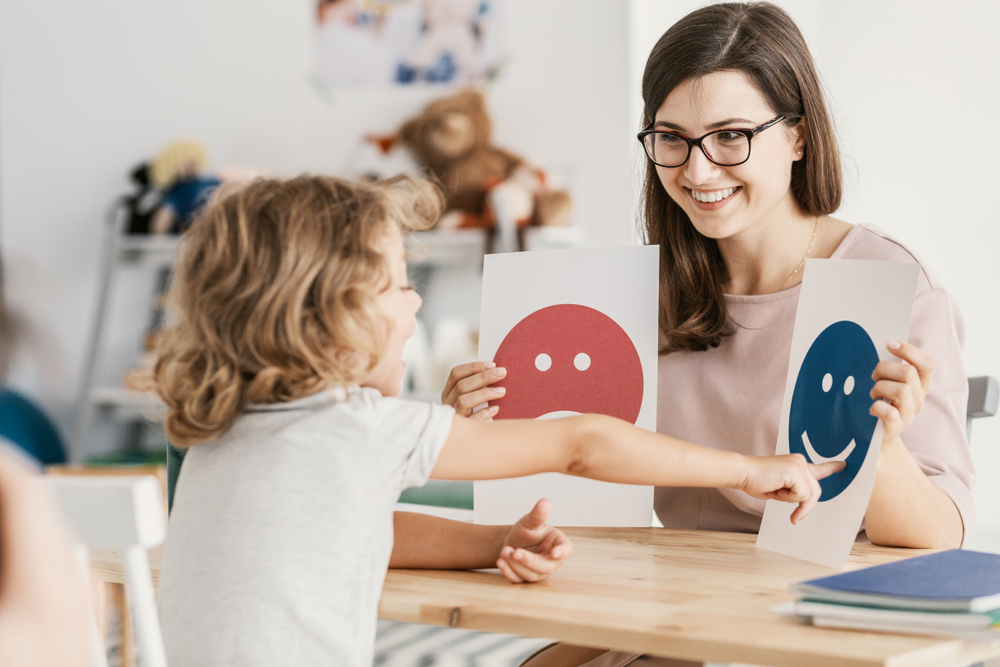Communication development for young children includes gaining the skills to understand and to express thoughts, feelings, and information, and encompasses both verbal and non-verbal cues.
Language development expert, Lois Bloom, further describes communication development “as guided by the need for relevance (i.e., communicating what is important), discrepancy (i.e., seeking to establish consistency of information), and elaboration (i.e., learning more complex language skills).”
Developing effective communication skills is essential for children’s success in both social and academic settings. Cognitive Psychologist Steven Pinker asserts, “communication is essentially a symbol-manipulating system that is present in very young children and that increases in complexity with age.” Parents and educators can help children hone the art of communication through nurturing and working on certain social skills, such as:
- Active listening: Active listening, as explained by the United States Institute of Peace, “is a way of listening and responding to another person that improves mutual understanding.” To promote active listening, children may be encouraged to listen to others without interrupting, ask clarifying questions, and respond with appropriate verbal and nonverbal cues to show that they are engaged in the conversation.
- Speaking clearly and confidently: Speaking clearly and confidently involves using appropriate volume, pitch, tone, and enunciation to express oneself in a manner that is respectful, concise, and easy to understand.
- Using appropriate nonverbal communication: Nonverbal communication is defined as the “transfer of information from one person to another without the use of words or spoken language.” Children can practice appropriate nonverbal communication in social interactions by maintaining eye contact, using appropriate facial expressions, and using gestures to emphasize their message.
- Asking for help when needed: Children should be encouraged to ask for help when needed and to be specific about what they need help with. This also provides children with an opportunity to express gratitude and appreciation when someone assists them which reinforces positive relationships and fosters a sense of community.
- Demonstrating empathy and compassion towards others: Although empirical evidence suggests that it may be typical for young children to have selfish impulses due to brain immaturity, developing kindness and empathy toward others is an essential life skill.
- Conflict resolution: Conflict resolution is the ability to resolve conflicts peacefully and collaboratively. Children should be encouraged to express their feelings respectfully and to listen to the perspectives of others to find a mutually beneficial solution.
Further Information and Support
For most of us, life can be very stressful, leading us to feel emotionally charged, which can cause anxiety, panic attacks, depression, and getting stuck in a cycle of being burdened with negative thoughts. Navigating through the challenges and emotional turmoil of life can be overwhelming, but you do not have to go through it alone. Engage Treatment is a Joint Commission Accredited professional psychological practice. We specialize in treating children, teens, and young adults struggling with depression and anxiety through community-focused treatment plans that incorporate a carefully selected combination of therapeutic interventions. Our compassionate, multidisciplinary practitioners are devoted to providing the highest quality of care that helps ignite positive change and enables clients to reach optimal health and well-being. Please do not hesitate to reach out for guidance. We are happy to answer questions and provide you with any additional information. Feel free to call us at 805-497-0605 or email us at [email protected]. You are also welcomed to get in touch by filling out our contact form. We look forward to connecting and having the opportunity to discuss how we might best be able to support you.
Contact Us
Westlake Campus:
IOP Program
2625 Townsgate Road, Suite 210
Westlake Village, California 91361
Agoura Campus:
Private Therapy & Parenting Program
30300 Agoura Road, Suite 250
Agoura Hills, CA 91301
805-497-0605
805-371-4862











© 2023 Engage Treatment Program, Inc. All Rights Reserved.
LGBTQ Friendly
About
• About Engage
• Our Team
• Career Opportunities
• Individual / Family Therapy






